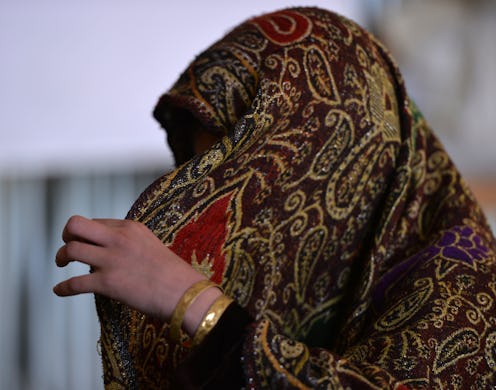News
A Pakistani Bride Accidentally Poisoned 27 People In Her Bid To Escape Forced Marriage

Not long after her marriage, a Pakistani woman was arrested for allegedly poisoning her new husband and family. The police accused her of putting a poisonous substance in the groom's milk, but when he refused to drink the milk, his mother served it to 27 members of the family in a yogurt drink, not knowing it was poisoned. 17 people died and 10 more are in the hospital. However, it's unclear if the woman's husband drank the yogurt drink his mother made, and if he was among the 27 members who were poisoned.
Asiya Bibi claims she was forced into a marriage in September in a village in the eastern Punjab province of Pakistan. District police chief Sohail Habib Tajak told the Associated Press she didn't agree to the union and wanted to return to her family. The story is further complicated by reports that she had a boyfriend at the time of the wedding who she continued to see. The police arrested Bibi, her boyfriend, and his aunt.
She reportedly confessed to poisoning the milk while in police custody and was charged with murder. Appearing in court Tuesday, she said her boyfriend gave her the poison, which she subsequently put in her husband's milk. Bibi claimed she only meant to harm her husband, not his extended family.
"I repeatedly asked my parents not to marry me against my will as my religion, Islam, also allows me to choose the man of my choice for marriage but my parents rejected all of my pleas and they married me to a relative," she told reporters.
After the tainted drinks were first consumed, eight people died, but the death toll continued to rise as time passed. The type of poison used is still unknown, but local police said it will be tested.
The police are now investigating if anyone else knew of the alleged plot to kill the new groom, and district police officer Muzaffargarh Awais Ahmad Malik told the BBC everyone would also be charged under anti-terror law.
"We include this clause primarily to deter the local people from committing such crimes," Mr Malik said. But, he added, those charges are usually dropped by a judge later on.
Bibi's desire to get escape her husband sheds light on the practice of forced marriage. To be clear, arranged marriage (which is common in rural parts of Pakistan) is different than forced marriage, which takes place when one or both parties don't consent to the union or are coerced into getting married. As a 2009 UN report on forced and early marriages explains, "In arranged marriages, the parents and families play a leading role in arranging the marriage, but the ultimate decision on whether to marry lies with the individuals getting married."
The UN considers both forced and early marriages human rights violations that disproportionately affect women and girls. Pakistan updated its laws on child marriage to include harsher punishments in 2015, but failed to raise the legal age from 16 to 18 the following year. Adult women who are married against their will have few protections.
Clear statistics on forced marriage are difficult to compile, as the problem goes largely undocumented. But while the UN acknowledges that men can be coerced or forced into marriage, it mostly affects women. A 2016 report by the UK’s Forced Marriage Unit listed Pakistan as one of the worst countries in terms of forced marriage. Of the 1,428 cases of possible forced marriage the unit investigated, 43 percent involved Pakistani couples. Of the 612 reported cases in the country, 63 percent involved a spouse with a learning disability, which the report says indicates they were unable to consent to the marriage.
While new brides poisoning their grooms isn't common, this case highlights a pervasive problem. Forced marriages, whether in Pakistan or any other nation, take away women's right to choose who to spend their life with.